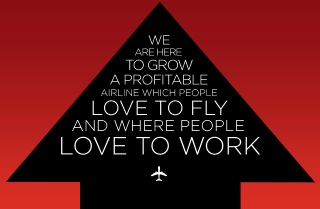If you type, “I love Virgin Atlantic” into a search engine, you will get almost 80,000 hits. If you do the same for British Airways the number is only 50,000. This is exceptionally impressive given that British Airways has ten times as many planes as Virgin Airlines.
People love Virgin Atlantic.
Throughout the nooks and crannies of the Internet, there are noteworthy comments about Virgin ensuring the happiness of its clients. From people being bumped up to first class without explanation, to how clean the plane was, to random customer service calls before a flight, Virgin seems to go above and beyond.
One customer wrote a personal account on his own website saying, “Thank you Richard Branson and your team at Virgin Atlantic. You’ve created two new advocates for your brand and you have shown that a small personal touch can have a huge impact on the overall customer experience and a companies ability to create brand advocates.”
So how does Virgin Airlines create such a positive following? How do they please their customers so well?
They have perfected the primary:
- They monitor and try to improve how often their flights arrive on time.
- They work to fairly compensate/make passengers comfortable in the case of a delayed flight.
- They keep track of how often they are short staffed.
- They ensure that the in-flight entertainment systems work, for every flight and every passenger.
- They ask passengers how clean the bathrooms are, and focus on making it a priority.
These are the basics, and they have them covered. The company is not promising you the world, they are promising you a respectable enterprise and comfortable experience. They are explicit in telling customers what is important to the company and how they deliver it.
Is your non-profit honest and explicit with its donors?
Virgin tends to also add the extra touches:
- Their sick bags are different and creative – with different photos of cartoons and characters.
- Each and every airplane has a name rather than a number. Lady Penelope, for example!
- In their lounges, they have a special roof to soften the sound.
Virgin Airlines is unique in that it considers how to surprise and delight their customers, and then proceeds to do so. These extra touches create an emotional connection with their customers. This is very beneficial, as their high customer satisfaction helps the company in sticky situations. If and when the airline makes a mistake, customers already have positive feelings associated with Virgin Atlantic and are therefore more likely to be forgiving and accommodating. So when the company has a delayed departure or missing luggage, hope is not lost for keeping a consumer loyal.
In their own words, here is how Virgin feels about their consumers:
“Customer service and commitment to our passengers has been the driving force behind our brand. We strive to get it right the first time, every time. Occasionally things do not go as planned. We believe that you have the right to know what level of service you can expect from us all the time, even in those rare moments when we fall short of the very high standards we have set ourselves.”
Virgin Airlines is a great example of a customer-centric organization. As non-profits begin to advance and move forward with their mission, they can look to examples of great companies such as Virgin for standards to set their own sights on. We already know that customer service is the reason most of these companies have become so successful. In the non-profit world, customer service = donor service. So our question is this:






